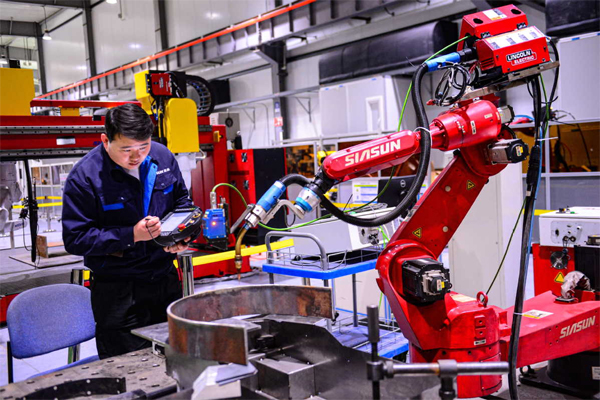Manufacturing on fast track to upgrading
Accelerated push is in line with aims of the 14th Five-Year Plan, experts say

An engineer checks a robotic arm at Xinsong Robot Automation Company in Shenyang, Northeast China's Liaoning province on Feb 8, 2022. [Photo/IC]
China is speeding up efforts to develop advanced manufacturing this year in a move to gain a key competitive edge in the global market and inject new impetus into the economy, experts said on Friday.
Their comments came as various regions across the nation recently announced key projects, mainly related to advanced manufacturing and strategic emerging industries.
Guangzhou Development District in Guangzhou, Guangdong province, launched 48 key projects on Tuesday. Thirty-nine are advanced manufacturing projects involving a total investment of around 38 billion yuan ($6 billion), mainly in fields such as next-generation information technologies, biomedicine, new energy and new materials.
Experts said the accelerated push to develop advanced manufacturing is in line with the requirements of the 14th Five-Year Plan (2021-25), which pledged to boost industrial upgrading and foster high-quality manufacturing.
They said China has the capabilities to meet the targets, as it has a complete industrial system, a large number of skilled workers, developed infrastructure and an ultra-large domestic market. During the next few years, the construction and development of advanced manufacturing clusters will be accelerated in an all-around way, they added.
Zhou Maohua, an analyst at China Everbright Bank, said the development of advanced manufacturing plays a key role in enhancing the core competitiveness of regional industries, promoting the transformation and upgrading of regional manufacturing and fostering high-quality development.
Song Jia, director of the innovation center at the Research Institute of Machinery Industry Economic & Management, said developing advanced manufacturing will help China move up to the middle and high end of the global value chain.
Song said local governments need to have a better understanding of local conditions and set reasonable development goals, with a key focus on promoting industrial restructuring by building leading industrial clusters.
More efforts should also be made to support the development of key sectors and enterprises, develop strategic emerging industries, attract more talent and create a better environment, Song added.
"Generally, advanced manufacturing consists of two parts. One is traditional manufacturing that integrates advanced manufacturing technology and other high-tech such as information and digital technology. The other is new sectors resulting from the industrialization of emerging technologies, such as bio-manufacturing and micro and nano manufacturing," said Dong Xiaoyu, a researcher at the Capital Institute of Science and Technology Development Strategy.
Facing a new round of technological and industrial revolution, Dong said manufacturing will play an increasingly important role in boosting the comprehensive competitiveness of countries.
He said the accelerated push to develop advanced manufacturing is conducive to boosting innovation-driven development and building a modern industrial system, which will help to enhance the core competitiveness of regions.
Looking at the 14th Five-Year Plan period, Dong said the construction and development of advanced manufacturing clusters will be significantly accelerated, as both eastern coastal provinces and inland regions are accelerating the manufacturing transformation.
He also warned of challenges ahead, saying that more efforts should be made to boost innovation. "China still lags behind developed countries in terms of core technologies and fundamental disciplines supporting the development of manufacturing. We need to further boost the development of industrial digitalization and digital industrialization to boost innovation in manufacturing."
Compared with China's advanced manufacturing counterparts, the country's manufacturing technologies and products are still at the middle to the low end in global markets, said Zheng Lei, chief economist at Glory Sun Financial Group.
Bai Ming, deputy director of international market research at the Chinese Academy of International Trade and Economic Cooperation, highlighted an acceleration in the movement of some manufacturing plants from China to overseas because of rising costs, saying that the nation needs to further boost the development of advanced manufacturing to improve its competitiveness in the global market.
He said China should give full play to its advantages in complete industrial chains, and more efforts should be made to support the development of some key industrial parks and create a business-friendly environment.



 Print
Print Mail
Mail

